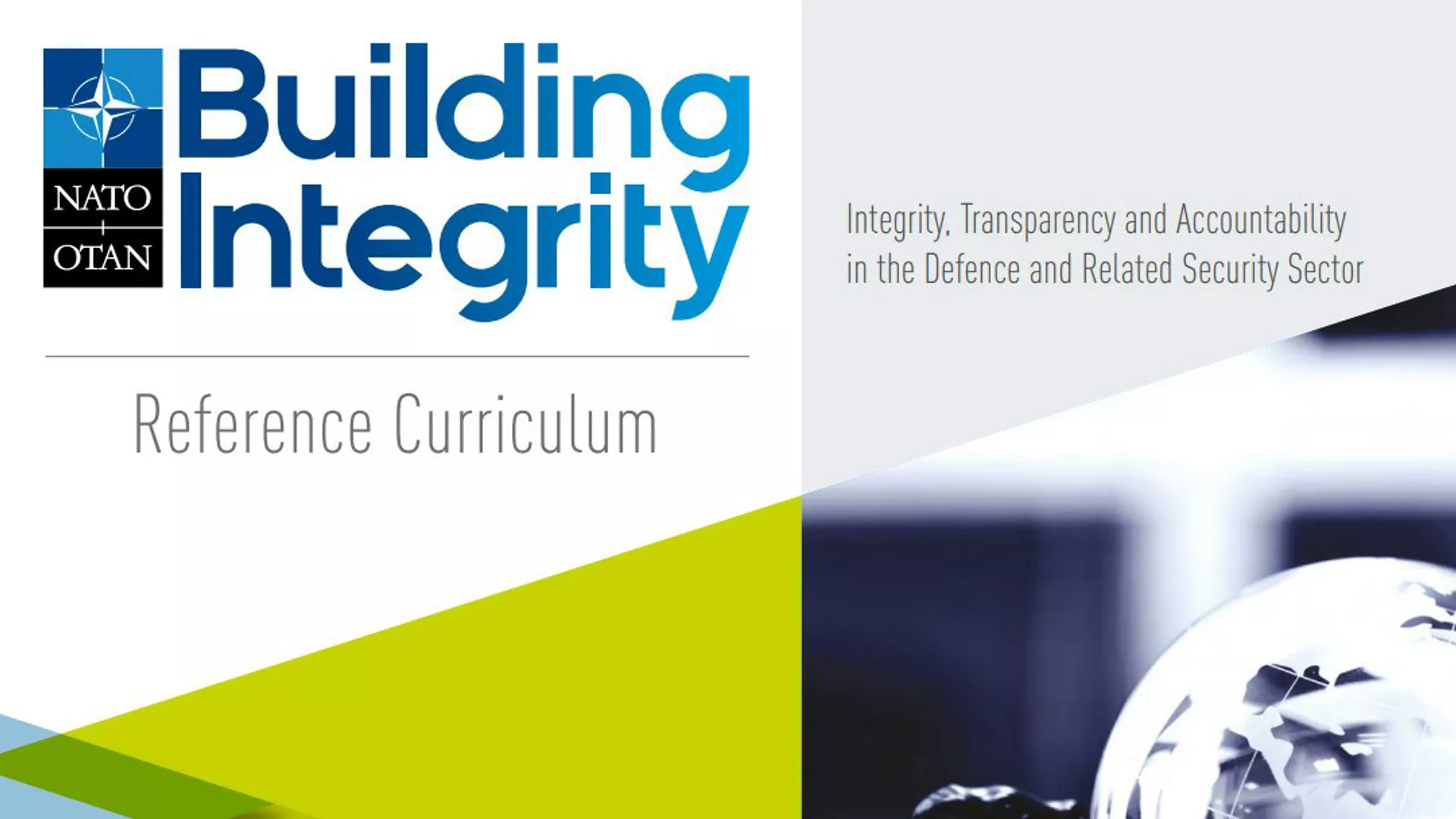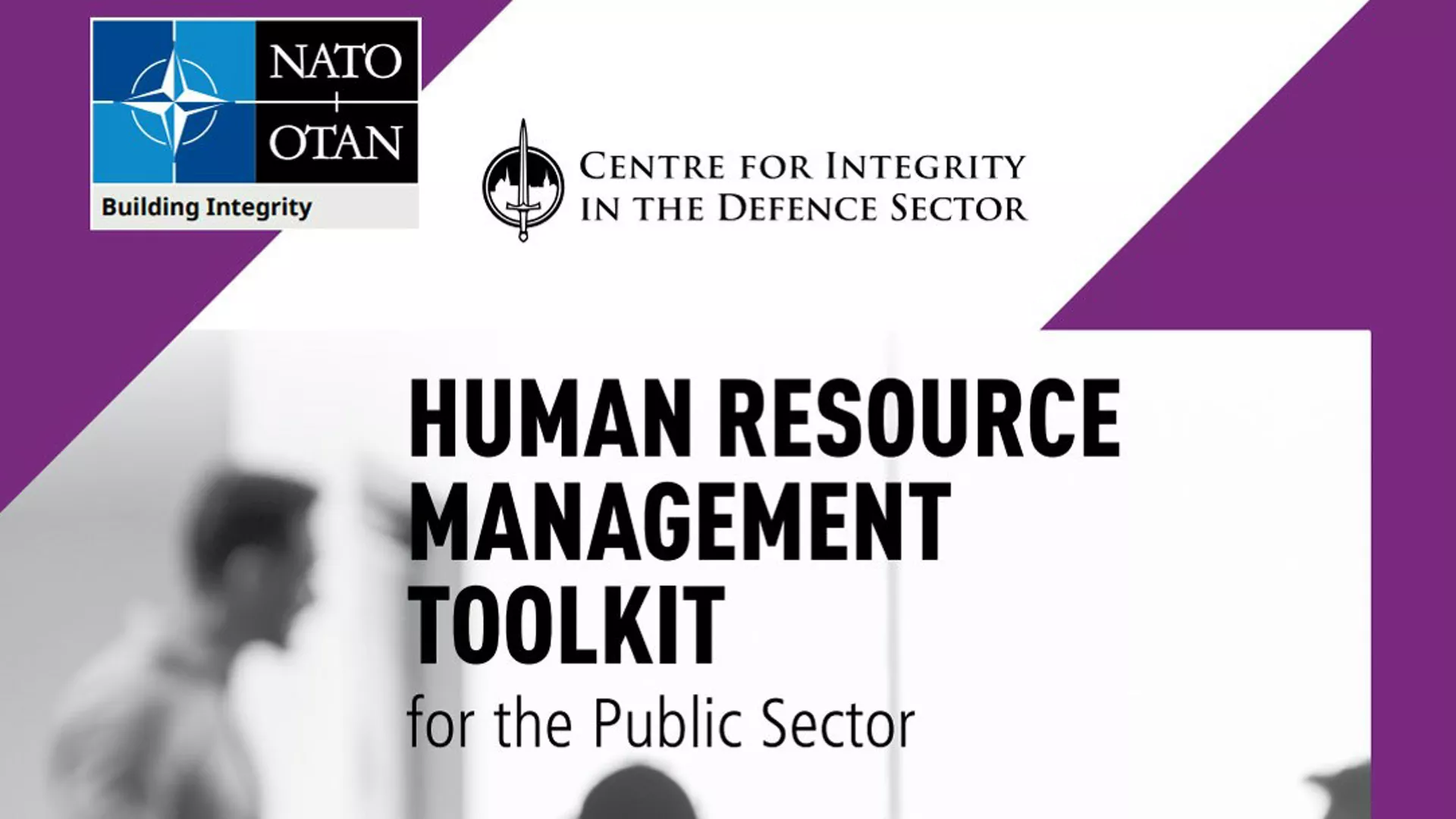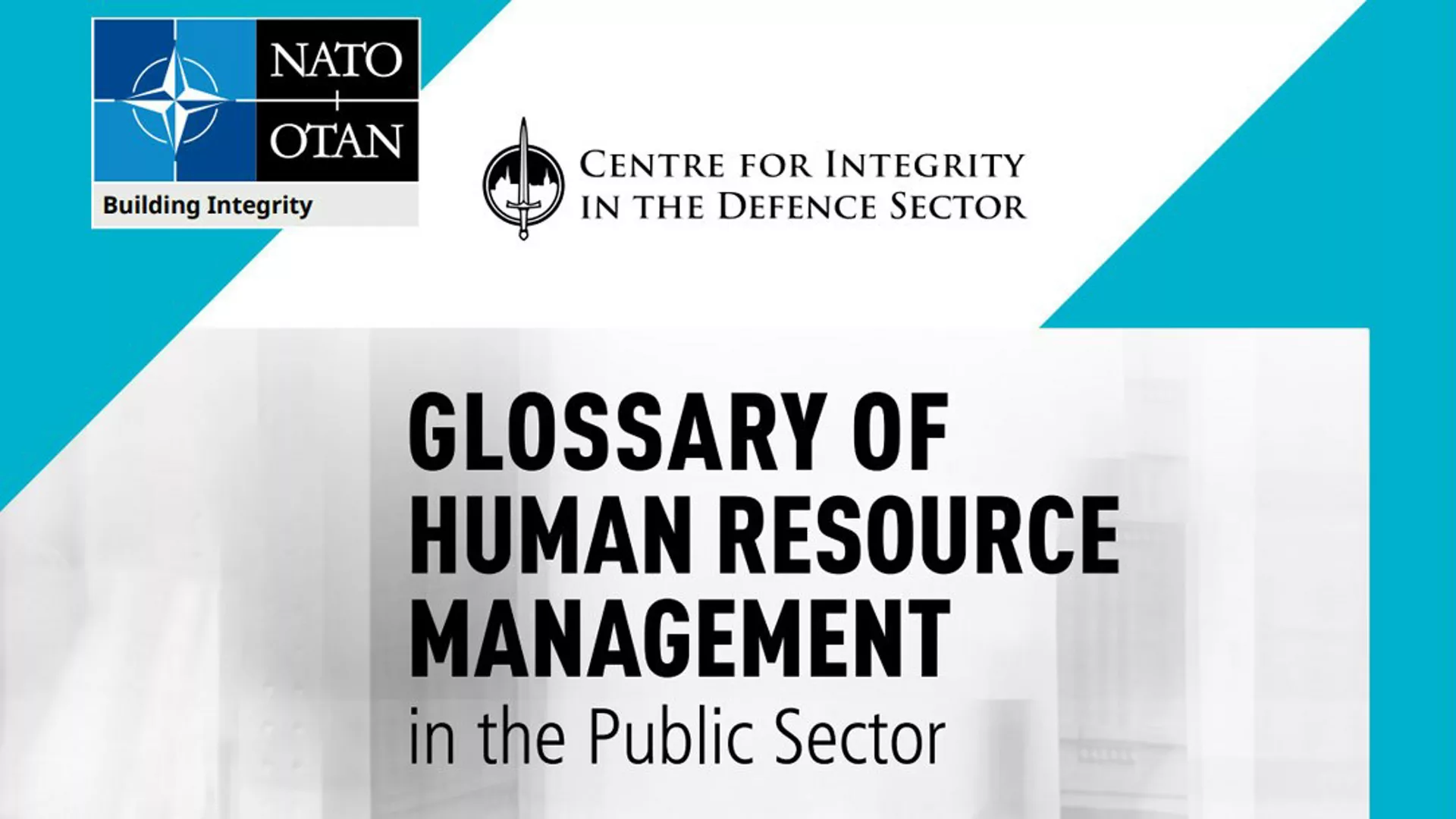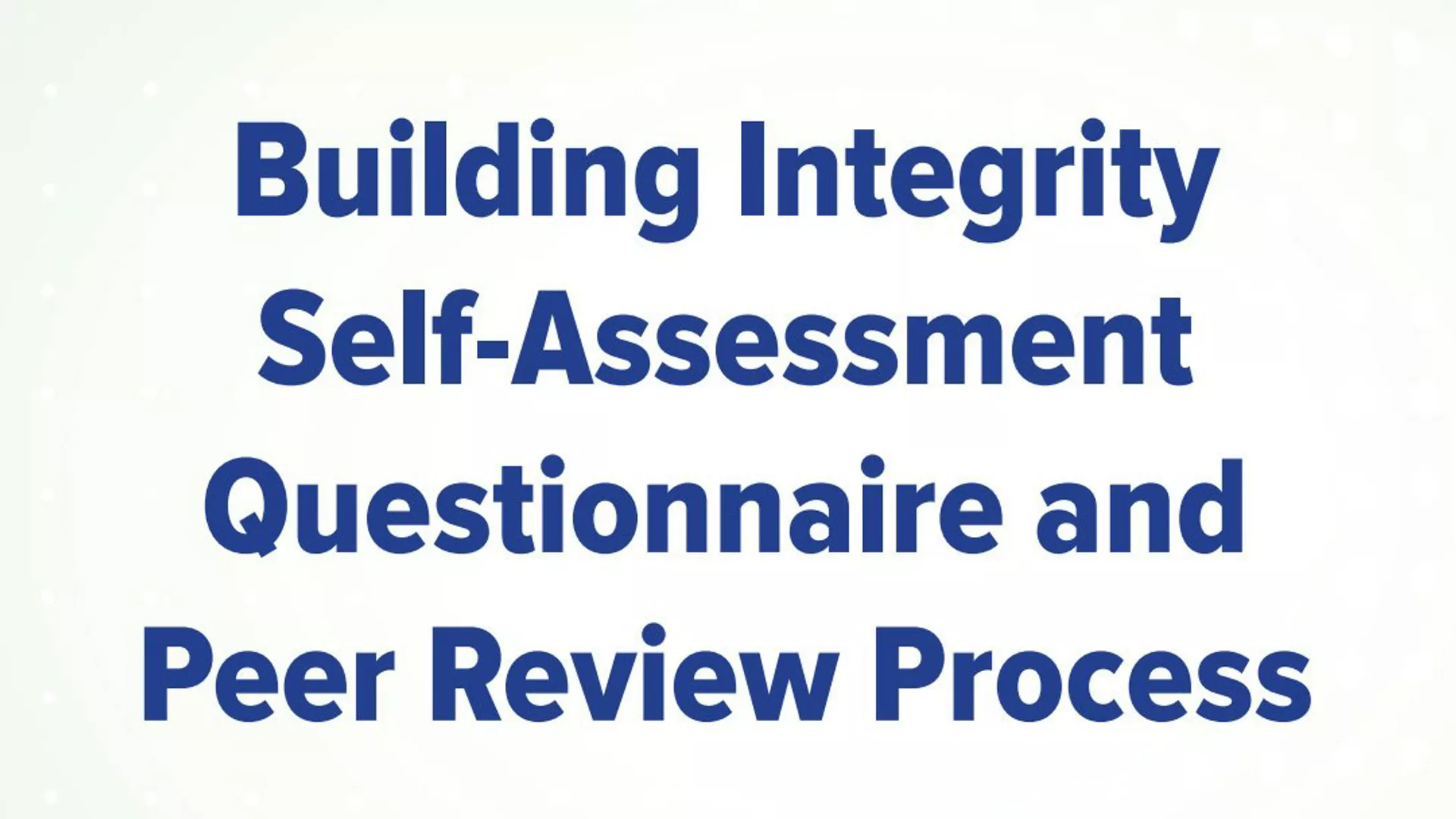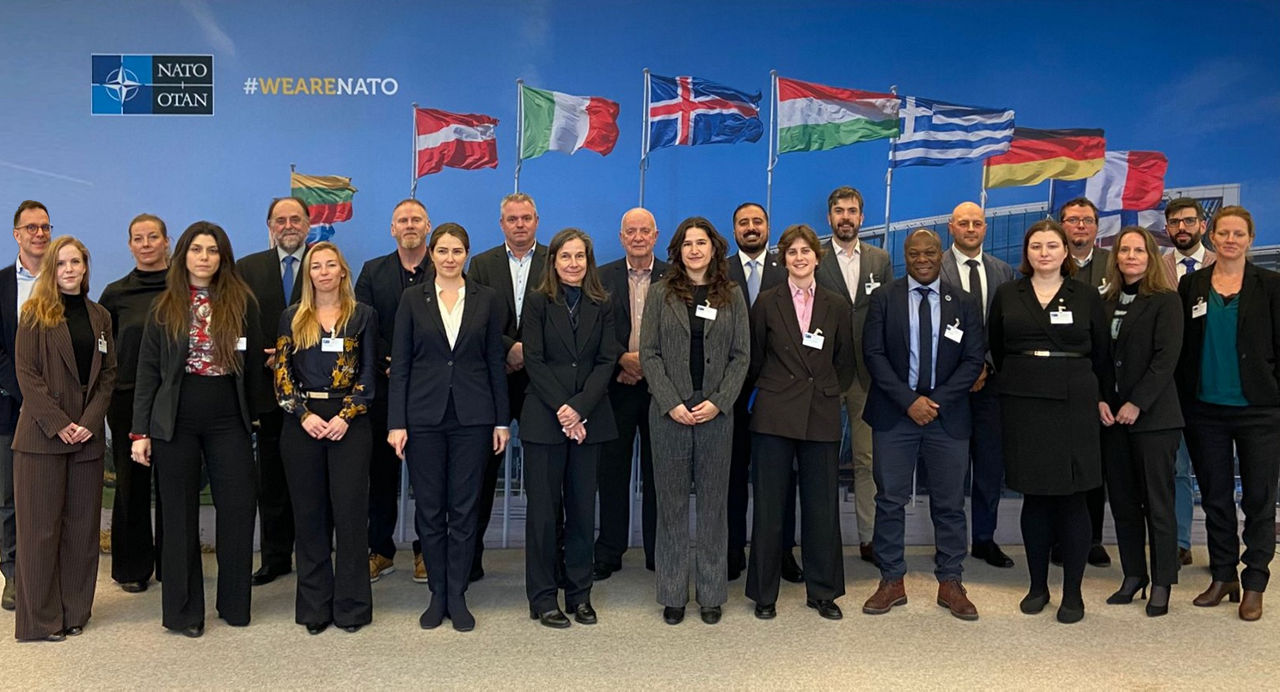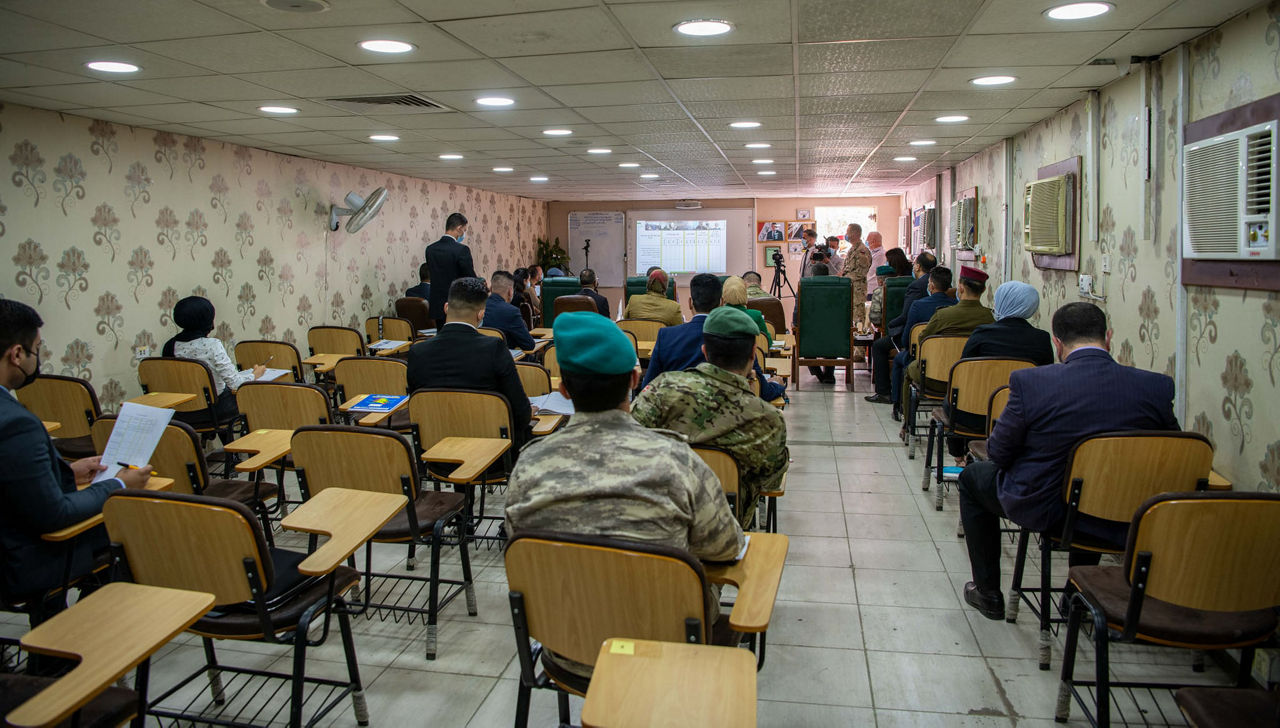Download NATO’s broadcast-quality video content free of charge

Log in
NATO MULTIMEDIA ACCOUNT
Access NATO’s broadcast-quality video content free of charge

Check your inbox and enter verification code
You have successfully created your account
From now on you can download videos from our website
Subscribe to our newsletter
If you would also like to subscribe to the newsletter and receive our latest updates, click on the button below.
Enter the email address you registered with and we will send you a code to reset your password.
Didn't receive a code? Send new Code
The password must be at least 12 characters long, no spaces, include upper/lowercase letters, numbers and symbols.
Your password has been updated
Click the button to return to the page you were on and log in with your new password.
Building Integrity
Updated: 22 January 2025
Transparent and accountable defence institutions under democratic control are fundamental to stability in the Euro-Atlantic area and beyond, and are essential for international security cooperation. Within the framework of the Building Integrity (BI) Policy, NATO works with Allies and partner countries to promote good governance and implement the principles of integrity, transparency and accountability in the defence and related security sector.
- The NATO Building Integrity (BI) Policy defines the Alliance’s approach to strengthening good governance and integrity in the defence and related security sector.
- The Policy acknowledges that corruption and poor governance are security challenges, as they undermine democracy, the rule of law and economic development. Similarly, corruption erodes public trust in defence institutions and has a negative impact on effectiveness in operations and missions.
- The BI Policy builds on the Building Integrity Programme, through which NATO has supported Allies and partner countries in building effective transparent and accountable security and defence institutions.
- A Military Concept of Building Integrity in Operations was approved in February 2021. Its purpose is to ensure that military processes as well as the staff that implement them account for, and mitigate, the risks posed by corruption throughout all stages of the planning and conduct of NATO-led operations and missions.
- The NATO BI Self-Assessment and Peer Review Process (or BI Process) is a voluntary, demand-driven diagnostic tool that offers participating countries strategic advice on sustainable reforms as well as tailored capacity-building at an institutional level. The goal is to help strengthen the management of their defence resources and prevent the risk of corruption in the defence and related security sector.
- As of September 2024, a total of 20 countries – both Allies and partners – have completed or are completing the BI Process.
- Ten partner countries that have completed the BI Process are currently cooperating with NATO through a tailored BI programme: Armenia, Bosnia and Herzegovina, Colombia, Georgia, Iraq (as part of NATO Mission Iraq), Jordan, the Republic of Moldova, Serbia, Tunisia and Ukraine.
NATO Building Integrity Policy
The NATO Building Integrity (BI) Policy reaffirms NATO’s role as a unique community of countries sharing common values, committed to the principles of individual liberty, democracy, human rights and the rule of law. Allies recognise that corruption and poor governance complicate every security challenge and undermine peace, security and prosperity as well as effectiveness in operations and missions.
The BI Policy, endorsed by the Heads of State and Government at NATO’s 2016 Warsaw Summit, reaffirms Allies’ conviction that transparent and accountable defence institutions under democratic control are fundamental to stability in the Euro-Atlantic area, and are essential for international security cooperation. BI-related efforts are an integral part of NATO’s work and are being mainstreamed in its activities, taken forward by the NATO International Staff, International Military Staff, Military Commands and Agencies.
Partners of the Euro-Atlantic Partnership Council (EAPC), the forum for consultation and dialogue between Allies and partner countries that was established in 1997, have contributed to the development of the NATO BI Policy and are associated with it. Two global partners – Australia and Colombia – are also associated with the BI Policy.
NATO Building Integrity Action Plan
The implementation of the BI Policy is supported by an Action Plan. In December 2016, NATO Foreign Ministers approved the first NATO Building Integrity Action Plan for the 2016-2020 period. In 2021, NATO Defence Ministers approved the second Action Plan for the 2021-2025 period.
The BI Action Plan sets the course for a strategic approach to building integrity and good governance in the defence and related security sector, and identifies concrete steps to make BI applicable across NATO’s political and military lines of activity. This includes:
- supporting defence reforms and institution-building in participating countries;
- mainstreaming good governance in NATO’s policies and partnership frameworks;
- linking NATO’s work on building integrity with other cross-cutting issues such as counter-terrorism, small arms and light weapons (SALW), and the Women, Peace and Security (WPS) agenda; and
- developing effective education and training solutions.
As a result of the implementation of the BI Action Plan by NATO’s political and military authorities, the achievements worth noting so far include:
- the integration of integrity and good governance as a distinct area of cooperation within NATO’s partnership mechanisms and defence capacity building;
- the advancement of the NATO Building Integrity Discipline as one of the 29 NATO Disciplines within Global Programming of Allied Command Transformation, NATO’s strategic command responsible for the transformation and development of military capabilities;
- the development and approval of the Military Concept of Building Integrity in Operations; and
- increased cooperation with other international organisations in the area of good governance.
Building Integrity Programme
NATO’s BI Policy draws on experience gained through the implementation of the Building Integrity Programme launched in 2007 by the Euro-Atlantic Partnership Council. NATO’s BI Programme is the framework for support to countries in developing effective, transparent and accountable defence institutions, which are responsive to unpredictable security challenges and are accountable to the risk of corruption and mismanagement of resources. This includes strengthening defence institutions, developing their leadership, individual and institutional capabilities, and improving the processes and procedures for managing defence resources. It also encompasses an enhanced understanding of corruption as a threat to peace and stability, including in the context of NATO-led operations and missions, and as part of capacity-building efforts in non-permissive environments, such as military conflict zones.
The activities of the programme are open to NATO Allies and partners alike, and take the form of strategic advice on sustainable reforms and of capacity-building at an institutional level.
This support is aligned with national priorities in the area of good governance and prevention of corruption. For Allies, integrity-related questions are included in the Defence Planning Capability Survey, a NATO tool used to collect detailed information on member countries' national defence plans and capability development efforts, in order to assess progress toward meeting NATO Capability Targets. BI-related activities are also fully integrated into NATO’s partnership mechanisms, including Individually Tailored Partnership Programmes (ITPPs) and Defence Capacity Building (DCB) Packages for individual partners.
From 2007 until 2023, NATO’s BI-related work was supported by the BI Trust Fund, which subsequently became the BI Initiative within the Partnership Trust Fund.
The NATO BI Programme, supported by both Trust Funds through financial and in-kind contributions from Allies and partners, followed four distinct phases of development:
- Phase I (2007-2010) was launched in the EAPC framework under the leadership of Poland, the United Kingdom and partner country Switzerland.
- Phase II (2010-2014) was developed under the leadership of Belgium, Bulgaria, Norway, Poland, the United Kingdom and partner country Switzerland.
- Phase III (2015-2018) was launched under the leadership of Bulgaria, Norway, Poland, the United Kingdom and partner country Switzerland, with a focus on developing practical tools and mainstreaming BI-related activities to support NATO and national requirements.
- Phase IV (2019-2023) was developed and implemented with the support of Norway, the United Kingdom, partner country Switzerland and the European Union.
Since 2024, NATO carries forward the BI Programme with NATO Civil Budget funding.
Building Integrity Toolkit
NATO has designed methodologies and practical tools to address the issues of good governance and prevention of corruption in the defence and related security sector.
The BI Toolkit was developed during Phase I of the BI Programme and included a Building Integrity Self-Assessment Questionnaire, to help participating countries map their current institutional policies and procedures related to integrity and good governance practice. It also included “Building Integrity and Reducing Corruption in Defence: a Compendium of Best Practices” (2010), a publication providing case studies on integrity building and anti-corruption measures, as well as introductory tools to support national institutions’ efforts in designing and applying a strategic approach to reducing corruption risks in the defence and related security sector. Allies and partners are encouraged to share their lessons learned and best practices of strengthening good governance at an institutional level and embedding the principles of integrity, transparency and accountability in the management of defence resources.
The BI Toolkit encompasses the elements outlined below and keeps evolving based on NATO’s priorities and its partners’ needs.
Self-Assessment and Peer Review Process
The Building Integrity Self-Assessment and Peer Review Process (the so-called BI Process) is the primary entry-level instrument for both Allies and partners to facilitate NATO’s engagement in this area of cooperation. It is designed as a voluntary diagnostic tool to map out national practices and procedures and to identify good practices and areas for further improvement. It serves as a baseline analysis to help shape NATO’s tailored support in the form of strategic advice and capacity-building on the basis of national needs and requirements.
As of September 2024, 20 countries – Allies and partners alike – have completed or are completing the BI Process, some of them for a second time: Afghanistan (2011), Armenia (ongoing), Bosnia and Herzegovina (2014), Bulgaria (2010), Colombia (2016 and 2023), Croatia (2011), Georgia (2016 and ongoing for a second time), Hungary (2015), Iraq (2024), Jordan (ongoing), Latvia (2012), the Republic of Moldova (2016 and 2024), Montenegro (2014), North Macedonia (2015), Norway (2009), Poland (2016), Serbia (2012), Tunisia (2024), the United Kingdom (ongoing) and Ukraine (2010, 2013, 2017 and 2019).
The process consists of three steps.
Step 1: Self-Assessment Questionnaire
The Self-Assessment Questionnaire (SAQ) is initiated by national authorities on a voluntary basis. This step allows national authorities to undertake, coordinate and lead an internal assessment of strengths and vulnerabilities of the national defence system from a good governance perspective, with a focus on nine areas:
- Parliamentary oversight and democratic control of armed forces;
- National anti-corruption strategies;
- Anti-corruption policies in the defence sector
- Management of human resources (behaviour, policy, training and discipline)
- Management of financial resources (planning and budgeting)
- Operations;
- Procurement;
- Engaging with defence companies and other suppliers;
- Country-specific questions.
The first step is completed when the questionnaire is officially submitted, allowing NATO to launch and conduct the Peer Review.
Step 2: Peer Review
The Peer Review consists of in-country consultations with national authorities. It is led by NATO with a team of subject matter experts and a peer representing a country that has already completed the process. The role of the peer is to ensure that the Peer Review is conducted in alignment with the principles and established practices of the process. The aim of the Peer Review is to validate the replies of the questionnaire provided by national authorities, ensure that the Peer Review team understands national priorities and institutional processes, identify national gaps and needs, and share views on best practices.
Each Peer Review is tailored to the needs of the individual country. NATO promotes the contribution of parliamentarians and civil society in the completion of the Self-Assessment Questionnaire and during the in-country Peer Review consultations.
Step 3: Final report
The BI Process is completed with the submission by NATO of the final Self-Assessment and Peer Review report to national authorities, outlining areas of good practice as well as NATO’s recommendations for areas that need improvement and further action. The decision to make the report publicly accessible rests with national authorities. Many countries have used the completion of the BI Process as a starting point for developing national integrity plans incorporating NATO recommendations among other national requirements.
Tailored programmes to build capacity
Tailored programmes are developed based on a country’s completion of the NATO BI Self-Assessment and Peer Review Process, and regular consultations. The support offered can include: capacity-building to reinforce national BI expertise and strengthen institutional capabilities to advance integrity and good governance in areas identified as vulnerable in the NATO Peer Review report through key leaders’ engagements; knowledge transfer and exchange of best practices at an institutional level; thematic workshops with expertise provided by subject matter experts in specific functional areas relevant to integrity and good governance in defence resources management as well as education and training activities. This support is reviewed and calibrated regularly in alignment with the level of maturity of national integrity systems and good governance reforms.
Currently, tailored Building Integrity programmes are ongoing in Armenia, Bosnia and Herzegovina, Colombia, Georgia, Iraq (as part of NATO Mission Iraq), Jordan, the Republic of Moldova, Serbia, Tunisia and Ukraine.
BI pool of subject matter experts
NATO staff have considerable experience in strengthening integrity, transparency and accountability in the defence and related security sector. To meet demand, this expertise is reinforced by subject matter experts drawn from the public and private sectors from Allied and partner countries, as well as other international organisations. The topics covered by the experts correspond to the areas identified in the Self-Assessment Questionnaire and include risk assessment and defence resource management across the functional areas of defence and related security institutions. The experts take part in the NATO-led Peer Review Process and contribute to peer-to-peer consultations and capacity-building activities, including BI training and education.
BI Community of Practice
BI capacity-building activities are implemented with the support of institutional partners: international, regional and national organisations with an interest in promoting good governance and integrity in the defence and related security sector. This Community of Practice includes civilian and military institutions located in Allied and partner countries, as well as across NATO structures, NATO Centres of Excellence and Partnership Training and Education Centres. This community promotes knowledge-sharing, best practices and lessons learned, thus contributing to the further development of new tools and methodologies to mainstream good governance and integrity in the defence and related security sector. The BI Community of Practice currently includes:
- European Union
- Organisation for Economic Co-operation and Development
- UN Office on Drugs and Crime
- UN Counter-Terrorism Committee Executive Directorate
- UN Department of Peace Operations
- World Bank
- South Eastern Europe Defence Ministerial
- US Special Inspector General for Afghanistan Reconstruction
- International Forum on Business Ethical Conduct for the aerospace and defence industries
- Academy of National Guards of Ukraine
- Building Integrity Training and Education Centre, Ukraine
- Centre for Integrity in the Defence Sector, Norway
- Defence Institution Building School, Georgia
- National Academy of Internal Affairs of Ukraine
- National Academy of the Security Service of Ukraine
- National Defence University of Ukraine
- Civil-Military Cooperation Centre of Excellence, The Netherlands
- Defence Resources Management Institute, United States
- Finnish Defence Forces International Centre, Finland
- Geneva Centre for Security Policy, Switzerland
- Naval Postgraduate School, United States
- NATO School Oberammergau, Germany
- Peace Support Operations Training Centre, Bosnia and Herzegovina
- Peacekeeping and Stability Operations Institute, USA
- Public Affairs Regional Centre, North Macedonia Regional Department of Defence Resources Management Studies, Romania
- Security Force Assistance Centre of Excellence, Italy
- Stability Policing Centre of Excellence, Italy
- PfP Training Centre and Centre of Excellence, Türkiye
- UK Defence Academy, United Kingdom
- Ammunition Management Advisory Team - Geneva International Centre for Humanitarian Demining (GICHD) and UN SaferGuard Programme, Switzerland
- Belgrade Centre for Security Policy, Serbia
- European Academy for Taxes, Economics and Law, Germany
- Foreign Policy Association of the Republic of Moldova
- Geneva Centre for Security Sector Governance, , Switzerland
- Global Organization of Parliamentarians Against Corruption, Canada
- Hertie School, Germany
- International Security Sector Advisory Team, Switzerland
- Partnership for Peace Consortium, Germany
- Stockholm International Peace Research Institute, Sweden
- Terrorism, Transnational Crime and Corruption Center, George Mason University, United States
- Transparency International, Defence & Security Programme, United Kingdom
- US Institute for Peace, United States
- NATO Defense College, Italy
- NATO Communications and Information Agency, Belgium
- Joint Analysis and Lessons Learned Centre, Portugal
- NATO Support and Procurement Agency, Luxembourg
- Joint Warfare Centre, Norway
Education, training and exercises
NATO addresses education as a vector for change that supports the implementation of integrity and good governance reforms. Building Integrity is one of NATO’s Academic Disciplines under the auspices of Allied Command Transformation. The BI Education and Training Plan was developed in cooperation with NATO Military Authorities and agreed by the North Atlantic Council in August 2012. Educational activities open to Allies and partners include residential, mobile training team and online courses, and train-the-trainers programmes. These activities may also be tailored to the specific needs of an individual or group of countries. So far, NATO designed and delivered bespoke train-the-trainers programmes for the Ministry of Defence of North Macedonia, the Ministerial Training and Education Centre of the Ministry of Defence of Iraq as well as for the Ministry of Internal Affairs of Ukraine and the Building Integrity Training and Education Centre of the National Defence University of Ukraine. The BI Reference Curriculum, developed with the support of the BI Community of Practice, is used by educators to update curricula and programmes of instruction, revise existing courses to mainstream BI, and develop new courses. BI-certified courses are conducted on a global basis and delivered by the Alliance and the network of NATO BI implementing partners. The NATO BI flagship course on “Defence Leadership in Building Integrity” is conducted annually at the NATO School in Oberammergau, Germany.
Working mechanisms
Implementation of the NATO BI Policy and Action Plan is coordinated by the NATO International Staff through a BI Task Force. This task force works closely with staff across NATO Headquarters, NATO Military Authorities, including the NATO International Military Staff, Allied Command Transformation, Allied Command Operations and subordinate commands, as well as NATO Agencies.
Global Programming at Allied Command Transformation coordinates the implementation of the NATO BI Discipline. Under its auspices, the NATO International Staff (Governance and Institutions Team), in its capacity as Discipline’s Requirements Authority, defines the training needs and requirements in line with identified performance objectives and competencies. On its part, the Centre for Integrity in the Defence Sector (CIDS) under the Norwegian Ministry of Defence, as Department Head of the NATO BI Discipline, is responsible for coordinating training and education solutions.
The NATO BI Programme has been supported throughout its different phases by the Building Integrity Advisory Group, which provides expertise, guidance and political support for NATO’s efforts on integrity and good governance in the defence and related security sector. Norway, the United Kingdom and partner country Switzerland are the current Advisory Group members. During Phase IV of the BI Programme in 2019-2023, the European Union (EU) was also a member. The EU provided funding for Phase IV and cooperated with NATO and the other Advisory Group members, as part of an agreement signed in December 2018 between NATO and the EU for cooperation in the area of integrity and good governance.
In addition to its cooperation with the European Union, NATO also works closely on Building Integrity initiatives with the United Nations, the World Bank, the Organization for Security and Co-operation in Europe, and the African Union, as well as the private sector, academia and civil society. This network of partners is drawn from NATO and partner countries and supports implementation within the BI Community of Practice.
Milestones
- In November 2007, the Building Integrity (BI) Programme was established by the Euro-Atlantic Partnership Council (EAPC) with the aim to develop institutional capabilities in key areas elaborated in the Partnership Action Plan on Defence Institution Building, agreed at the 2004 Istanbul Summit.
- In August 2012, further to North Atlantic Council agreement, Building Integrity was established as a NATO Education and Training Discipline within the framework of Global Programming of Allied Command Transformation.
- The NATO BI Policy was endorsed by the Heads of State and Government at the NATO Summit in Warsaw in July 2016, with the Warsaw Summit Communiqué articulating the link between corruption and security.
- In December 2016, NATO Foreign Ministers approved the first NATO Building Integrity Action Plan for the 2016-2020 period. Since then, the importance of building integrity and strengthening good governance has been highlighted at subsequent NATO summits and their communiqués.
- In December 2018, NATO and the European Union signed an agreement to enhance their cooperation in promoting good governance in the defence and related security sector. As part of this agreement, the European Union contributed EUR 2 million to the Building Integrity initiative of NATO’s Partnership Trust Fund (formerly the NATO Building Integrity Trust Fund) for 2019-2022 initially and then extended to the end of December 2023.
- The second BI Action Plan for 2021-2025 was approved by NATO Defence Ministers in February 2021.
- The Military Concept of Building Integrity in Operations was agreed by the North Atlantic Council in February 2021.
- NATO’s 2022 Strategic Concept, adopted at the 2022 Madrid Summit, highlights the importance of good governance for the implementation of the Alliance’s three core tasks, i.e. deterrence and defence, crisis prevention and management, and cooperative security. The Strategic Concept reinforced NATO’s political commitment to democracy and strong institutions, and also addressed terrorism exploiting weak governance.


